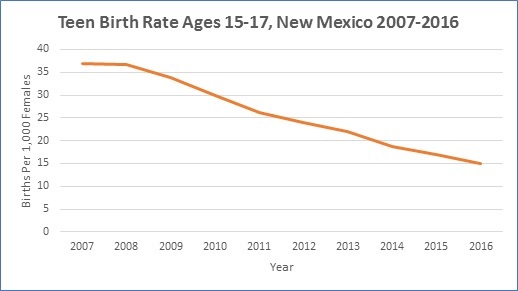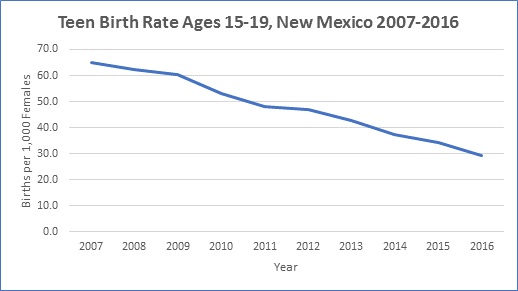SANTA FE, NM – The New Mexico Department of Health (NMDOH) reports a decrease in the 2016 teen birth rate in the state, continuing a steep decline that began in 2007. Births to teens in New Mexico are now at their lowest point in many decades:
- The birth rate for teens ages 15 to 19 fell 14 percent from 2015 to 2016, and 55 percent over the past nine years. (The teen birth rate for ages 15 to 19 was 29.4 per 1,000 females in 2016.)
- Additionally, the birth rate for teens ages 15 to 17 saw a significant drop: down by 11 percent from 2015 to 2016, and nearly a 60 percent decrease since 2007. (The teen birth rate for ages 15 to 17 was 16.9 per 1,000 females in 2016.) These declines in teen births in New Mexico are similar to national declines observed during the same period. Despite the continued decrease in teen births, New Mexico still has among the highest teen birth rates in the nation.
"While we are making important progress in reducing teen pregnancy and unintended pregnancy in New Mexico, the reality is that too many teens are still having babies," said New Mexico Department of Health Cabinet Secretary Lynn Gallagher. "We remain committed to continuing our comprehensive approach to teen pregnancy by helping teens find access to family planning services, access to the most effective contraceptive, and appropriate sex education programs."
NMDOH's Family Planning Program provides access to confidential, low- or no-cost family planning services through public health offices, community clinics, and school-based health centers and has worked with the clinics to maintain access to birth control for teens.
The Family Planning Program also uses telemedicine to serve areas with a shortage of providers. In 2016, providers statewide benefited from distance medical education and care management via a Project ECHO (Extension for Community Healthcare Outcomes) Reproductive Health TeleECHO clinic. The weekly one-hour clinic is made available by a partnership between NMDOH, the University of New Mexico, and New Mexico Human Services Department's Medicaid program.
The downward trends in teen births occur at a time when more New Mexico teens being served at Title X Family Planning clinics have chosen long-acting reversible contraception (LARC) as their primary birth control method. Additionally, the New Mexico Medicaid Program has changed its policy to separately reimburse providers for the provision of LARC in various settings. In 2016, through Centennial Care, more than 10% of New Mexico teens in need of publicly supported contraceptive services chose LARC.
Additionally, NMDOH's educational programs for youth include service-learning, positive youth development, and comprehensive sex education programs. Adult-teen communication programs give adults information and skills to communicate effectively with young people about reducing risky sexual behavior. The Family Planning Program also offers BrdsNBz, a text-messaging system for teens with free, confidential answers to sexual health questions in English or Spanish.
For more information on teen birth rates and on family planning programs for adults and teens, visit https://nmhealth.org/about/phd/fhb/fpp/.

